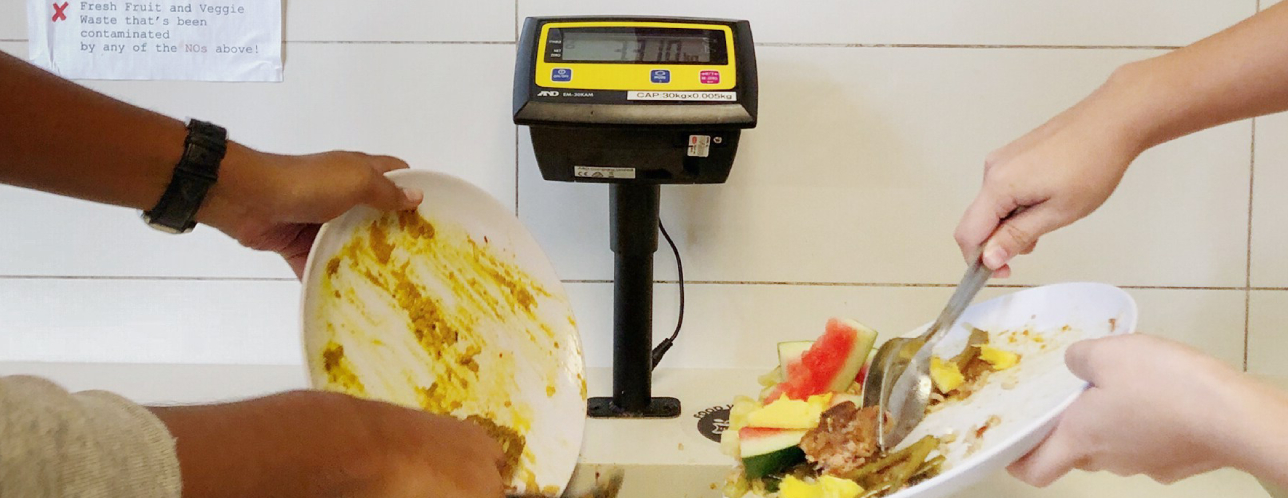If you’re anything like us, you probably wouldn’t have thought much about leaving some leftover food behind after your meal. While it may not seem like it would do much harm, most of our seemingly harmless leftovers have contributed to an increasing amount of food waste — one of the biggest waste streams that we are experiencing here in Singapore.
Over the last 10 years, the amount of waste generated in Singapore has grown by about 30%, and in 2018 alone, we generated a total of 763 million kilograms of food waste; which is more than the weight of 54,000 double-decker buses put together. Despite efforts in trying to slow the amount of food waste generated, it seems that our growing population and economic activities have created a challenge in tackling the issue.

Why is food wastage a problem?
In a nutshell, wasted food has environmental, economic and social implications. Here in Singapore, food waste makes up about half of the average amount of waste disposed of by each household. When food is wasted, so are all of the effort and resources spent on growing and delivering the food to our tables, as well as to dispose of it. This increases our carbon footprint, which contributes to the rising concern of global warming and climate change.
The increasing amount of food waste also puts pressure on the country’s resources, such as land space. As it is important to ensure food waste disposal is managed properly, the government will need to look into building more waste disposal facilities that include waste-to-energy plants as well as landfills for incinerated ash — which is not a sustainable plan for our land-scarce Singapore.

Who are the contributors to food waste?
Each year, an estimated 800,000 tonnes of food waste is generated in Singapore, and around half of that amount comes from non-domestic sources which are your food retailers, hotels, and shopping malls.
Apart from them, local households have also been singled out as one of the biggest contributors to the rise in food waste. Based on a 2019 study conducted by the Singapore Environment Council (SEC) and Deloitte Singapore, about $342 million in unconsumed food is thrown away annually across all households — which is equivalent to 68,400,000 plates of delicious Nasi Lemak being tossed out across Singapore!
What is being done to reduce food waste?
To increase awareness of the food waste situation we have in Singapore, the government is currently engaged in ongoing food waste reduction publicity and outreach programmes in hopes of encouraging locals to minimise their food wastage through adopting smart food purchase, storage and preparation habits.
The respective authorities have also started several pilot projects within the heartlands to encourage responsible food waste disposal, and test the feasibility of using on-site systems to treat food waste at hawker centres.
What other food waste initiatives are there?
On the community front, a local charity organisation, Food from the Heart has launched the Bread Run programme and the Clean Plate Campaign to help individuals reduce food waste while helping to feed those in need.
The Bread Run programme is a collaborative effort between Food from the Heart and more than 100 Bread Run partners (mostly bakeries and hotels) to collect excess bread after closing time for distribution to individual beneficiaries. The bread is typically allocated for consumption during breakfast and tea break at welfare homes or repacked into smaller denominations that are given out as weekly rations to individual families.

Started in 2013 in conjunction with World Food Day, the Clean Plate Campaign is an initiative aimed at raising awareness of the environmental and societal impact of food waste while helping to develop the habit of mindful consumption. Working together with schools, Food from the Heart encourages students to end each meal with a clean plate and better play a part in curbing the rise of food waste. Since 2018, a total of 43,000 clean plates have been counted by students from 65 of the participating schools.
Food from the Heart has also launched a Community Shop @ Mountbatten to allow beneficiaries the opportunity to physically pick out the food items they need instead of relying on the standard food packs that often result in several unused items.
How can I play a part in reducing my food waste?

1. Purchase Only What You Need
It is said that about 24% of households often end up throwing away spoilt or rotten food because they either forgot about the items hidden away at the back of their fridge, or they’ve bought too much food that they couldn’t finish. So, before heading out to the supermarket, make a shopping list of the groceries you intend to buy. This is to ensure that you don’t end up with excess food that you cannot consume by the use-by date and minimise your food expenditure.
You can also apply the same principle when you’re out having a meal. Instead of a list of countless dishes, aim to order only what you can finish. And, if you’re someone with a smaller appetite, ask for less rice or noodles, and skip side dishes that you won’t eat.

2. Create New Dishes with Your Leftovers
Instead of throwing away your leftovers, opt to do the next best thing and turn them into tasty new dishes such as French Toast Cups, Cheesy Rice Balls, and Watermelon Pickles using innovative recipes which you can find here.
Another tip to keep in mind is during the preparation of your meal. Instead of throwing out the off-cuts of meat and vegetable stems or roots, you can consider using these unlikely ingredients to make stocks. Even the rinds of citrus fruits can also be used to add a little zest for flavour in your dishes!

3. Donate Your Excess Food
Probably one of the best ways to prevent food waste is to donate your excess food to needy organisations where they can re-distribute your good-for-consumption food items to welfare homes and other beneficiaries.
You can consider donating your excess food items to Food Bank Singapore, Fei Yue Community Services, Willing Hearts, or Food from the Heart.
For more information on food waste management in Singapore, click here.
Featured image credit: The Octant and Elesin Teo











You must be logged in to post a comment.